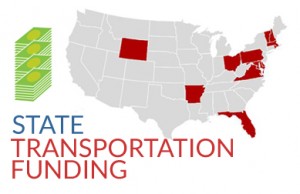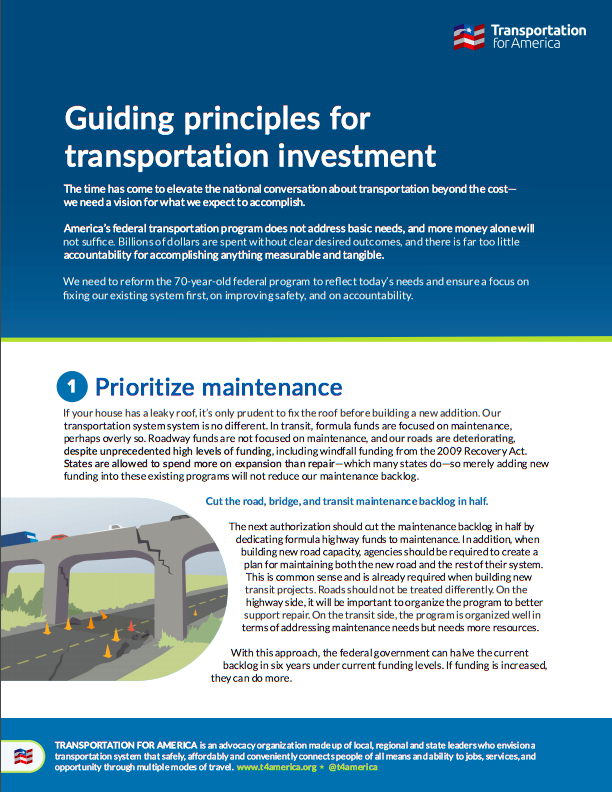As many states close out their legislative sessions, the latest intel on state transportation funding
As we near the midpoint of the year and some state legislatures wrap up their sessions or approach recess, it’s a good time to take a look at where a few states stand on their efforts to raise new transportation funding.
In the only state to raise new money since our last update, Nebraska’s legislature passed and then overrode Republican Gov. Pete Ricketts’ veto (30-16) of a 6-cents-per-gallon gas tax increase, to be phased in over the next four years. The additional tax will annually bring in $25 million for state roads and $51 million to be distributed to cities and counties when fully implemented.

Follow state transportation funding updates for every state as they happen with T4America’s state funding tracker.
A handful of states have been searching for ways to improve transparency and accountability as a first step to raising new funding. In Louisiana, the House and Senate unanimously passed a bill in May that reforms the way the state DOT prioritizes and selects highway projects in an effort to provide greater transparency to the process. This strong piece of legislation was introduced and advanced by a member of T4A’s state advocacy network (START), House Speaker Pro Tempore Walt Leger.
(We hope to go into more detail soon on this trend of states either reforming their project selection process or expanding the use of performance measures, so stay tuned for that. -Ed.)
Additional bills that would raise gas and general sales taxes to fund transportation projects have cleared committee, though a bill to raise the state sales tax by one cent to fund major projects just fell short of the two-thirds majority it needed to pass the House last week.
Some other states are still active in their legislative sessions with transportation funding proposals on the docket, while a handful of others have failed to pass a package during this session.
California’s Senate is considering a bill that would hike the state gas tax by 10-cents-per-gallon (and the diesel tax by 12-cents-per-gallon), increase the vehicle tax to 1 percent of the value of the vehicle, increase registration fees by $35, and add a new $100 annual fee on electric vehicles.
Projections show the bill would bring in more than $4 billion annually. The bill has been cleared out of multiple senate committees. It requires a two-thirds supermajority to pass.
Just a year after Texas voters overwhelmingly approved a separate measure to set aside a portion of oil and gas royalties explicitly for highways, legislators in Texas have reached a deal that will direct a greater share of future state sales tax revenue to transportation. Specifically, $2.5 billion of the state sales tax revenue will be reserved for transportation, so long as overall sales tax receipts are at least $28 billion (approximately the collections this year). Additionally, 35% of revenue growth from taxes on vehicle sales and rentals will be set aside for transportation beginning in 2020, netting $250 million to $350 million annually.
The House and Senate have both passed the bill, and now it will need approval from Texas voters in November.
In Delaware, Gov. Markell is urging legislators to pass a $25 million annual increase in transportation funding through increased vehicle fees.
Minnesota’s legislature adjourned without reaching an agreement on how to increase funding for transportation and passed a status-quo budget instead. But with a special legislative session looming, there’s a possibility that legislators will have another opportunity to reach an agreement on new funding.
Similarly, Missouri failed to pass a transportation funding measure. The legislature had debated a 2-cent-per-gallon gas tax increase, but adjourned without passing the measure. According to that state’s DOT, legislators must come up with new state funding in their next session or the state will not have adequate money to match federal transportation dollars, leaving federal money on the table.
In Oregon, legislative negotiations over new transportation funding seem to have ground to a halt.
But Oregon is on the leading edge of testing a new mechanism for funding transportation that could serve as a model for the rest of the country, shifting away from a per-gallon tax to a tax on miles traveled. This month the state started enrolling 5,000 drivers into its new (voluntary for now) road usage charge program called OReGO. The new road usage charge program officially began Tuesday.






Pingback: Today’s Headlines | Streetsblog St. Louis